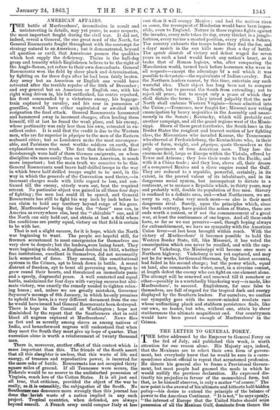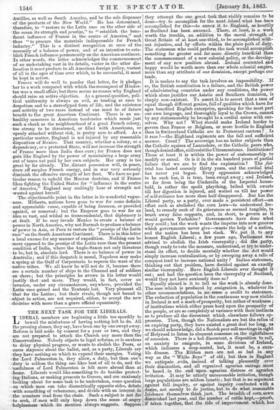THE LETTER TO GENERAL FOREY. Antilles, as well as South
America, and be the sole dispenser of the products of the New World." He has determined, therefore, to "restore to the Latin race on the other side of the ocean its strength and prestige," to "establish the bene- ficent influence of France in the centre of America," and thus "to procure the materials indispensable for French industry." This is a distinct recognition at once of the necessity of a balance of power, and of an intention to esta- blish French influence permanently on the American continent.
In other words, the letter acknowledges the commencement of an undertaking vast in its details, vaster in the utter dis- location it must preclude in all American foreign policy, vastest of all in the ages of time over which, to be successful, it must be kept in action.
France will do well to ponder that letter, for it pledges her to a work compared with which the reconquest of Hindos- tan was a small affair; but there seems no reason why England should raise an active objection. As a general question, poli- tical uniformity is always an evil, as tending at once to despotism and to a stereotyped form of life, and the existence and activity of two races instead of one must be of future benefit to the great American Continent. There is an un- healthy sameness in American tendencies which needs just such a check as the neighbourhood of a great French colony, too strong to be threatened, or filled with Americans, or openly attacked without risk, is pretty sure to afford. As a particular matter, England is not injured by any reasonable disposition of Mexico. That country, whether a colony, or a dependency, or a protected State, will not increase the strength of France more than India does ours ; for France does not gain like England by the power of maintaining a large army out of taxes not paid by her own subjects. Her army is too great by far already. The, distant possession will, in peace, draw off surplus French energy, and in war very seriously diminish the offensive strength of her fleet. We have no par- ticular reason to uphold the Monroe doctrine, and if France likes fighting the United States for "influence in the centre of America," England may smilingly hear of strength not wasted against herself. The objectionable point in the letter is its wonderful vague- ness. Hitherto, nations have gone to war for some definite and appreciable cause, capable of being foreseen, or provided against, or removed ; but the Emperor goes to war for an idea so vast, and withal so transcendental, that diplomacy is at fault. If he may invade Mexico to create a balance of power in North America, why not Burmah to produce a balance of power in Asia, or Peru to restore the "prestige of the Latin race" on the South American Continent. There is in this letter a local excuse for any manner of expedition. Nothing can be more opposed to the prestige of the Latin race than the present condition of India, where the A.nglo-Saxon not only threatens to be, but is, absolute lord. There is no balance of power in Australia; and if this despatch is moral, Napoleon may make a spring at the Gulf of Carpentaria to repress the wars of the native tribes. We all know he will not do it, because there are a certain number of ships in the Channel and of soldiers on shore ; but the principles he avows in his letter would justify that and more. They would, in fact, cover an invasion, under any circumstances, anywhere, provided the Latin race gained and the Teutonic lost. Very pleasant all that for the Latins ; but their rivals, though not bound to object in action, are not required, either, to accept the new doctrine with more than a grave official equanimity.































 Previous page
Previous page